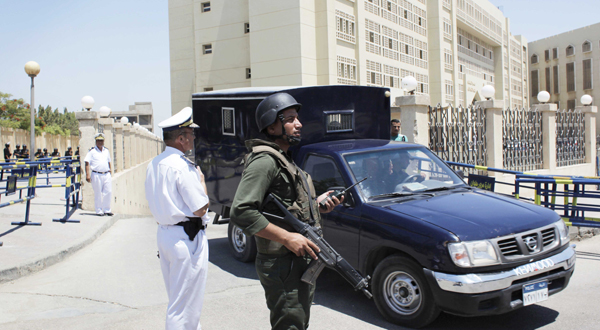 CAIRO: An Egyptian court cleared three ministers from former President Hosni Mubarak's administration of graft on Tuesday, the first ruling to exonerate such senior officials since Egypt's popular uprising.
CAIRO: An Egyptian court cleared three ministers from former President Hosni Mubarak's administration of graft on Tuesday, the first ruling to exonerate such senior officials since Egypt's popular uprising.
Some of the defendants looked surprised when Judge Mohamed Fathi Sadek read the verdicts in the courtroom, which was filled mainly with their relatives and friends. Cheers of "Long live justice" erupted.
Former Information Minister Anas El-Fiqqi and former Finance Minister Youssef Boutros-Ghali were acquitted of charges of squandering public funds. Boutros-Ghali, who has fled the country, was tried in absentia.
In a separate ruling, the same court acquitted former Housing Minister Ahmed El-Maghraby and Palm Hills Development Chairman Yasseen Mansour of graft.
The three ministers still face trials on other charges or have already been found guilty in separate corruption probes.
The protests that unseated Mubarak in February were driven by widespread anger at high-level corruption and the trials of his former associates are regarded as a credibility test for the military council that took power after his downfall.
Frequent protests calling for faster prosecution of the former leader and an end to police brutality occasionally lead to clashes with security forces.
Activists are calling for another mass demonstration on July 8 to press for a quicker trial of Mubarak and his former lieutenants, and a swifter move to democracy from military rule.
"I am going down on the 8th," said one Facebook user, Mohamed Ali, who complained of "the slow process of trials, insulting the martyrs of the revolution, exonerating the ghouls of the fallen regime and the return of police abuse as they act like little Pharaohs."
Protest in Suez
Some commentators have warned that the judicial crackdown on graft under Mubarak could tarnish innocent officials by mere association with the previous administration.
"What happened today is that Egypt is proving once again it has judicial integrity," said a lawyer for one of the exonerated ministers. "The verdicts fall under the legitimacy of the justice system and not the legitimacy of the revolution."
The public prosecutor for financial crimes said he would appeal because the verdicts contradicted the evidence, and he demanded a retrial and a new judge.
Most popular indignation is directed towards Mubarak, his close allies and former Interior Minister Habib El-Adly, who along with six other former senior officials is charged with killing protesters.
At least 840 people died in the uprising and anger is still raw among relatives, some of whom blocked a main road to Cairo late on Monday after a court freed police officers from the port city of Suez who were on trial over the deaths.
More than 1,000 people continued to protest in Suez in Tuesday, some of them chanting "Mubarak left the palace but his dogs are still running the country".
Revolution ongoing
Large crowds have turned out for hearings involving El-Adly, prompting calls for his trial to be moved to a bigger location – even a stadium – to accommodate all the activists, lawyers and relatives of the dead and injured.
Field Marshal Mohamed Hussein Tantawi, who heads the ruling military council, said the army would pay LE 100 million ($16.8 million) into a recently-created fund for the bereaved families.
Corruption cases have proved less emotive. Dozens of riot police guarded the Cairo court house on Tuesday when the verdicts were read out but only a small crowd of supporters of the former ministers demonstrated.
Tuesday's verdicts "are all cases of financial corruption. They are not the main, vital cases that public opinion is concerned with," said Adel Soliman, head of the Cairo-based International Centre for Future and Strategic Studies.
"The message for next Friday is that revolutionary sentiment in Egypt has not yet calmed, that the revolution's demands have not been met and that it insists on seeing them met."
El-Fiqqi, who was close to Mubarak, faces other charges, and Boutros-Ghali and Maghraby have been sentenced to terms in prison for other crimes.
The prosecutor indicted El-Fiqqi and Boutros-Ghali in March on charges of profiteering and wasting public funds after investigations showed El-Fiqqi received LE 36 million from the Finance Ministry for parliamentary election media campaigns and to promote the ousted ruling party.
El-Fiqqi still faces charges that he deliberately misused funds from the state-run Radio and Television Union.
Boutros-Ghali is widely viewed in Egypt as a public face of a government that enriched the wealthy at the expense of the poor. He quit his post in late January then fled abroad only days after the eruption of the uprising that ousted Mubarak.
He was convicted last month and sentenced to 30 years in prison for profiteering and abuse of state and private assets.
In a third ruling, former Trade Minister Rachid Mohamed Rachid was sentenced in absentia to five years in prison for squandering public funds.
Rachid was convicted in June to five years in prison for profiteering and squandering public funds.



